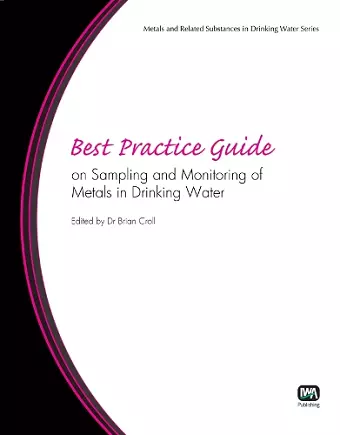Best Practice Guide on Sampling and Monitoring of Metals in Drinking Water
Format:Paperback
Publisher:IWA Publishing
Published:15th Jan '12
Currently unavailable, and unfortunately no date known when it will be back

Part of Metals and Related Substances in Drinking Water Set - buy all five books together to save over 30%!
There is increasing concern regarding the presence of metals, particularly heavy metals in drinking water. In addition to the well-known toxic effects of lead, which are discussed at length in the Best Practice Guide on the Control of Lead in Drinking Water (in this series of Guides), the latest WHO guide values for maximum mean concentrations of arsenic, nickel and others in drinking water have been lowered compared to previous versions. European Union, USA and National standards for drinking water have followed the trend based largely on the same toxicological information.
There is currently growing interest in the presence of hexavalent chromium in drinking water following its finding in some drinking waters in the USA above the national upper limit for total chromium and research suggesting that this limit needs to be considerably lowered. Some metals, particularly iron and manganese are associated with the production of discoloured (dirty) water in distribution systems and are therefore very important to the production of water with acceptable aesthetic qualities. Others (iron and aluminium) are key to the treatment of raw waters to drinking water standards. In most cases it is not possible to continuously monitor waters for metals and suitable sampling programmes must be designed and carried out to give results representative of the true water quality.
The Best Practice Guide on Sampling and Monitoring of Metals in Drinking Water gives guidance on the design and quality control of sampling programmes for metals in Raw waters, in the water treatment works, in the drinking water distribution system and at the consumers tap. It also gives guidance on the analytical methods that can be used for the analysis of metals and quality control of those methods. Sampling programmes on the same water will vary according to the purpose for which they are carried out and the statistical techniques used to determine and design the different types of programme are outlined. Finally some case studies of optimisation of sampling are set out.
Best Practice Guide on Sampling and Monitoring of Metals in Drinking Water is a valuable text for scientists, engineers and...
"Sampling plays a crucial role in a Drinking Water Safety Plan, the risk management plan of a drinking water treatment plant. This Best Practice Guide on the Sampling and Monitoring of Metals in Drinking Water gives the state-of-the-art tools to develop a sampling and monitoring programme for both operational and compliance monitoring." DR EDDO HOEKSTRA, Institute for Health and Consumer Protection, Joint Research Centre of the European Commission
ISBN: 9781843393832
Dimensions: 234mm x 156mm x 18mm
Weight: unknown
156 pages